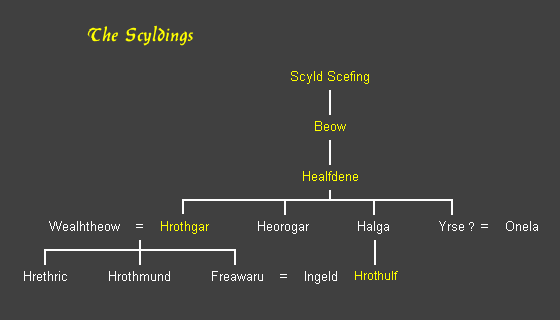Beowulf and the Scyldings
House of Hrethel
On his mother's side, Beowulf belonged to the royal house in Geatland, which was a kingdom in southern Sweden. His maternal grandfather was King Hrethel. Note that the name of Beowulf's mother was not given in the story, but she was the daughter of King Hrethel and the sister of King Hygelac.
On his father's side, Beowulf belonged to a lineage known as the Wægundings, a noble house of warriors. His father was named Ecgtheow. Wiglaf, his young kinsman, perhaps his nephew or great nephew, also belonged to this line.
Beowulf could have become king after the death of his uncle Hygelac, but he refused the throne, offered by Hygd, Hygelac's wife. The reason why she wanted Beowulf to be king instead of her son Heardred, was because she feared an invasion from the Frisians and the Swedes, Geatland's neighbours; she believed that the kingdom's best hope of avoiding invasion was the enemies' fear of Beowulf. Heardred died in battle, so Beowulf received the crown anyway.
Because Beowulf had no children of his own, his kingdom fell after his death, from an invasion by his neighbours.
The Scyldings
Hrothgar, the friend of Beowulf and king of Sjælland (Zealand), belonged to the royal house founded by his great-grandfather, Scyld Scefing. This royal house was known as the Scyldings. Hrothgar was the son of Healfdene and grandson of Beow.
Hrothgar's capital was called Heorot, but the monster Grendel menaced his great hall, killing and devouring many of his thanes. Heorot was the centre of Beowulf's first adventure.
In the Icelandic myth, Scyld is Skiold, Healfdene was Halfdan, Hrothgar was Hroar, Halga was Helgi and Hrothulf was Hrolf. Not only the Old English names were different from the Norse figures, but the two different traditions were also different in plot and details. In the Icelandic tale, Hroar (Icelandic counterpart of Hrothgar) was never king of Denmark, whereas in Beowulf he was. The Norse Helgi played a more prominent role in the Icelandic tradition as king of Denmark, whereas the English Halga was barely mentioned.
Old English | Norse-Icelandic |
Scyld Scēfing | Skiold (Skjöldr) |
Frōda | Frodi (Fróði) |
Healfdene | Halfdan (Hálfdan) |
Hrothgar (Hrōðgar) | Hroar (Hróarr) |
Hālga | Helgi |
Hrothulf (Hrōðulf) | Hrolf Kraki (Hrólfr) |
By Jimmy Joe







